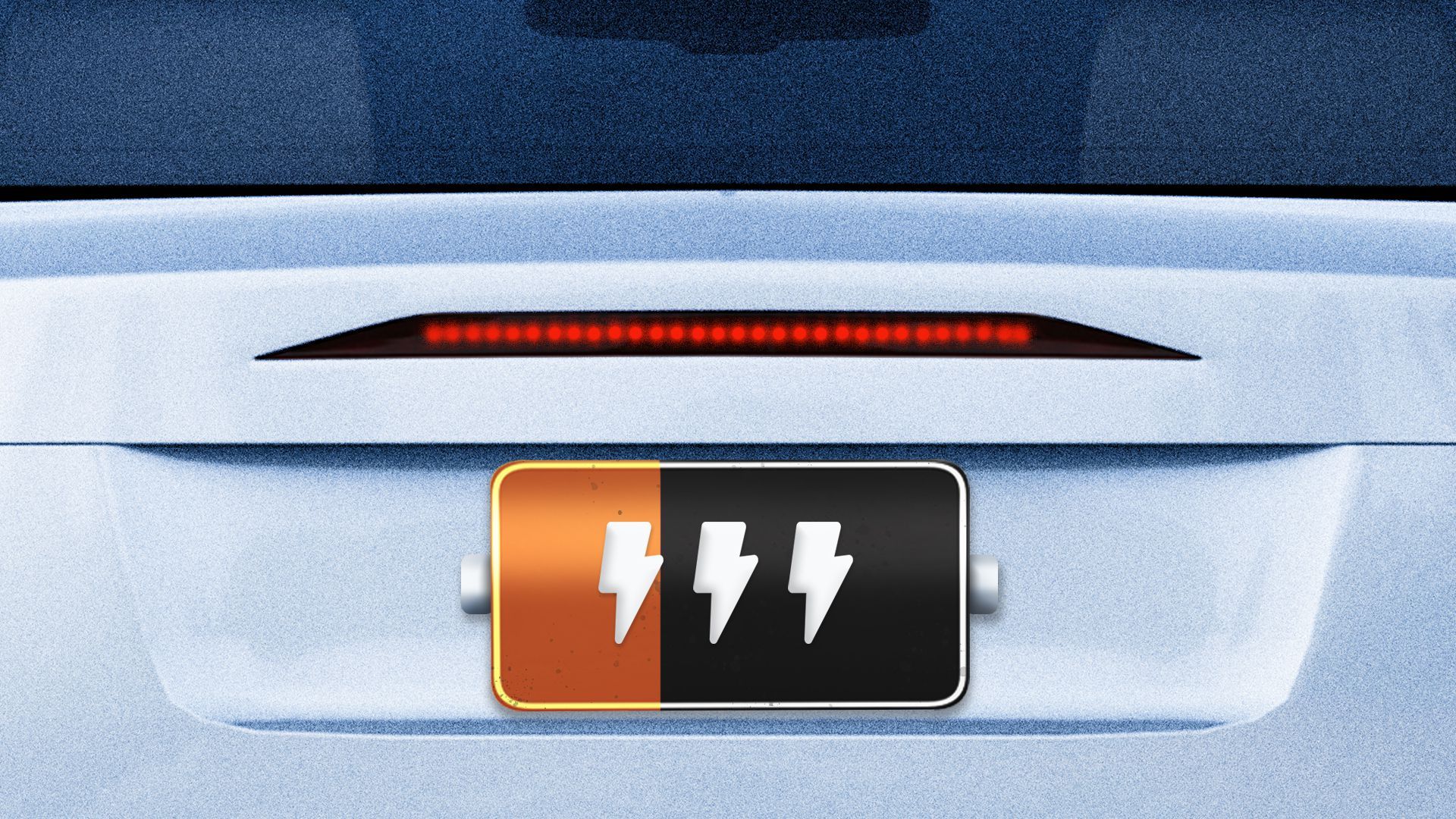| | | | | | | | | | | Axios What's Next | | By Alex Fitzpatrick, Jennifer A. Kingson and Joann Muller · Jun 29, 2022 | | Alex here. I used to think savings interest rates tracked the Fed rate pretty closely in both directions. But as I found out in reporting my story today, not so much — and that has big implications for our money. Today's Smart Brevity count: 1,148 words ... 4½ minutes. | | | | | | 1 big thing: It's still hard to save $$$ |  Data: FRED, Bankrate.com; Chart: Erin Davis/Axios Visuals As the Federal Reserve raises rates to fight inflation, you might find yourself checking to see if your savings account's interest rate is rising to match, Alex Fitzpatrick reports. - After all, the idea is to make saving more attractive than spending to cool an overheating economy, right?
Yes, but: Historically, savings account interest rates haven't climbed in lockstep with the Fed rate — even though they tend to fall when the Fed rate does. Why it matters: As higher interest rates make it more expensive for Americans to pay off their mortgages, auto loans and credit card bills, many will be desperate for any financial leg up — especially as inflation skyrockets and even the basics get more expensive. The details: The data charted above comes from Bankrate's survey of big U.S. banks, and "larger banks have a lot of pricing power," says Bankrate chief financial analyst Greg McBride. - "They rarely pay up for liquid money such as savings accounts and checking accounts," adds McBride.
The big picture: Banks are historically slow to raise the rates they pay on deposit accounts — after all, they don't have to because they don't need to compete very hard for people's money. Even if the big banks aren't rushing to raise interest rates, you can still find relatively good alternatives by shopping around. The alternatives... - Certificates of deposit (CDs) track the Fed rate much more closely. But they're offered on time-based terms (e.g. 6 months, 12 months, etc.) and you'll be penalized for early withdrawals.
- Over long enough timelines, stocks blow traditional savings accounts out of the water, returns-wise (especially if you reinvest your dividends). But markets do sometimes fall — the S&P 500 is down around 20% year to date.
- I Bonds — long-term government savings bonds with an interest rate that partially adjusts with inflation — offer rates above 9% and are all the rage among some money experts right now. But there's a limit on how many you can buy, and as with CDs, there are penalties for tapping out early.
What's next: Savings interest rates should keep rising "in the months to come" says Kendall Little, a personal finance writer at NextAdvisor. - That's especially true for online-only banks, local banks and credit unions, Little adds, which are in much hotter competition with one another for your dollars compared with the big banks.
Share this story. |     | | | | | | 2. Big tech mum on abortion data |  | | | Illustration: Allie Carl/Axios | | | | When law enforcement demands personal data belonging to those suspected of getting an abortion, tech firms will likely hand it over, Axios' Ina Fried and Margaret Harding McGill report. Why it matters: Companies like Google and Facebook collect enormous volumes of personal data, including information about where we've been, what we've bought, whom we've talked to and what we've said. The big picture: Big tech companies aren't directly answering questions about how they will respond to such inquiries following last week's Supreme Court ruling. What's at stake: Period-tracking apps have drawn attention for obvious reasons, but the potentially relevant data is far wider — think purchase records, search queries, location info and more. How it works: Law enforcement already seeks access to location data, content, usernames, browser history and other online activity from tech companies through warrants or subpoenas. - Now, they will seek that same information in connection with abortion investigations in states that have criminalized it, says India McKinney, director of federal affairs for the Electronic Frontier Foundation.
What's next: Activists are encouraging tech companies to imagine the types of data their products might generate and how that information could be used by law enforcement. Read the rest. |     | | | | | | 3. ⚡️ Biden's $700M EV plan |  | | | President Biden test drives a GMC Hummer EV in Detroit, Mich. Photo: Mandel Ngan/AFP via Getty Images | | | | A handful of companies are investing more than $700 million to expand the domestic electric vehicle charging infrastructure, the Biden administration announced Tuesday, as Axios' Ben German and Erin Doherty report. Driving the news: The investments will help the U.S. build more than 250,000 EV chargers annually, the White House said. - Volkswagen unit Electrify America announced an investment of $450 million, while Siemens is kicking in more than $250 million.
The big picture: President Biden is aiming to build a national network of 500,000 public charging stations by 2030. Read more. |     | | | | | | A message from Axios | | Get the latest Axios Pro industry report | | |  | | | | 10 Axios Pro journalists help you understand what matters, what to watch, and what's coming across the dealmaking world this year. Read the report. | | | | | | 4. We're all tuning out the news |  | | | Illustration: Annelise Capossela/Axios | | | | People around the world are running from the news, Axios' Mike Allen, Erica Pandey and Jim VandeHei report. Why it matters: Coverage of these painful times is ruining our mood, burning us out and just plain confusing us. Those are the findings of a new report from Reuters Institute and the University of Oxford about "selective news avoidance." What's happening: With the pandemic, a fractured Washington and the war in Ukraine, we've had more than two years of distressing, divisive news. - Past studies have shown constant bad news can give us PTSD-like symptoms.
- Plus journalists often do a lousy job: Many younger people "say they avoid news because it can be hard to follow or understand," per the report.
The result: News trust in the U.S. is the lowest among the 46 countries polled for the report, at 26%. Read the rest. |     | | | | | | 5. What you're saying: To EV or not to EV |  | | | Illustration: Sarah Grillo/Axios | | | | What's Next readers sent us a ton of interesting emails about why you have — or have not — gone electric. Here are a few converts: - "No more gas pumps for our family," says Bruce Riley. "We'll charge mostly at home, and the energy for the car batteries will come from our solar panels. This is the future now."
- "No oil consumption, no gasoline consumption, and GhG emissions," writes Rev. Bud Adams. "Other benefits such as no fuel pump / filter, no catalytic converter, no air filter, no serpentine belt, no spark plugs or fuel injectors, no starter motor, etc."
- And here's Judy Spencer: "Four years ago I bought a Honda Clarity PHEV and could not be more pleased! Most of my driving is local so I rarely use the backup gas engine, but it is there for peace of mind. I have taken one long trip, 800+ miles each way, without any difficulty. I charge overnight in my garage on regular 120 house current, supplied by my rooftop solar panels."
And some of those who haven't yet switched: - "I currently have two kids and want to trade in my current SUV for something with third-row as they have friends coming with us to more stuff, but the market is SUPER limited for EV SUVs that meet what I'm looking for," says Heather Valudes.
- "I would love to buy an electric car but price is prohibiting me: price of the car, home charger installation and limited battery range for the more affordable options," writes Joyce Kossey.
- And here's droptop fan Justine Estée: "I would love to own an EV. However, I love my convertible more, and until they make a fully convertible model I won't be switching."
As always, you can reach out to us about this or any other topic we cover at whatsnext@axios.com. |     | | | | | | A message from Axios | | Get the latest Axios Pro industry report | | |  | | | | 10 Axios Pro journalists help you understand what matters, what to watch, and what's coming across the dealmaking world this year. Read the report. | | | | Was this email forwarded to you? Get your daily dose of What's Next magic by signing up here for our free newsletter. |  | It's called Smart Brevity®. Over 300 orgs use it — in a tool called Axios HQ — to drive productivity with clearer workplace communications. | | | | | | Axios thanks our partners for supporting our newsletters. If you're interested in advertising, learn more here.
Sponsorship has no influence on editorial content. Axios, 3100 Clarendon Blvd, Suite 1300, Arlington VA 22201 | | | You received this email because you signed up for newsletters from Axios.
Change your preferences or unsubscribe here. | | | Was this email forwarded to you?
Sign up now to get Axios in your inbox. | | | | Follow Axios on social media:    | | | | | |










No comments:
Post a Comment